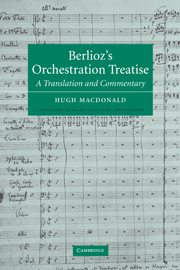Book contents
- Frontmatter
- Contents
- List of illustrations
- Preface
- A note on the edition
- A note on the translation
- Acknowledgments
- List of abbreviations
- The Treatise
- Introduction
- 1 Bowed strings
- 2 Plucked strings
- 3 Strings with keyboard
- 4 Wind: Introduction
- 5 Wind with reeds
- 6 Wind without reeds
- 7 Wind with keyboard
- 8 Brass with mouthpiece
- 9 Woodwind with mouthpiece
- 10 Voices
- 11 Pitched percussion
- 12 Unpitched percussion
- 13 New instruments
- 14 The orchestra
- 15 The conductor and his art
- Appendix: Berlioz's writings on instruments
- Bibliography
- General index
- Index of Berlioz's works
6 - Wind without reeds
Published online by Cambridge University Press: 22 September 2009
- Frontmatter
- Contents
- List of illustrations
- Preface
- A note on the edition
- A note on the translation
- Acknowledgments
- List of abbreviations
- The Treatise
- Introduction
- 1 Bowed strings
- 2 Plucked strings
- 3 Strings with keyboard
- 4 Wind: Introduction
- 5 Wind with reeds
- 6 Wind without reeds
- 7 Wind with keyboard
- 8 Brass with mouthpiece
- 9 Woodwind with mouthpiece
- 10 Voices
- 11 Pitched percussion
- 12 Unpitched percussion
- 13 New instruments
- 14 The orchestra
- 15 The conductor and his art
- Appendix: Berlioz's writings on instruments
- Bibliography
- General index
- Index of Berlioz's works
Summary
THE FLUTE
For a long period this instrument was most imperfect in many respects, but it is now, thanks to the skill of certain makers and to the method of manufacture adopted by Boehm following Gordon's discovery, as comprehensive, as accurate in tuning and as even in sound as one could wish.
The same will soon be true, moreover, of the whole woodwind family. Their intonation could clearly never be anything near irreproachable since the holes had always been bored to accommodate the natural spacing of the player's fingers and not in accordance with the rational division of the resonating tube, a division based on the laws of resonance and determined by the nodes of oscillation. Gordon, followed by Boehm, began by boring wind instruments at the precise positions on the tube required by the physics of resonance without any regard for the facility or even the possibility of placing fingers over each hole. They were confident that they could then make it possible by one method or another.
Once the instrument was bored according to this procedure and made in tune, they worked out a mechanism of keys and rings placed where the player's fingers could easily reach and designed to open or close those holes that lie beyond the reach of the fingers. The old fingering has thus had to be changed and players have had to develop new ways of practising.
- Type
- Chapter
- Information
- Berlioz's Orchestration TreatiseA Translation and Commentary, pp. 137 - 152Publisher: Cambridge University PressPrint publication year: 2002



